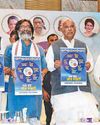‘Secularism’ inhabits twin strands—one simply strives to control religion; another, more composite view, allows plural views on faith to coexist. Charting secularism’s progress in France and the US, Charles Taylor alights on the passionate debate it is generating in modern Europe and India.

Everyone in the West agrees today that modern, diverse democracies have to be ‘secular’, in some sense of this term. But what sense? The term (along with the corresponding French term ‘laicite’, and its derivatives) has more than one sense. There are in fact many different meanings, but I believe that we can get to a crucial issue if we single out two key conceptions.
On one view (A), secularism is mainly concerned with controlling religion. Its task is to define the place of religion in public life, and to keep it firmly in this location. This doesn’t need to involve strife or repression, provided various religious actors understand and respect these limits. But the various rules and measures which make up the secularist (or laique) regime all have this basic purpose.
On the other view (B), the main point of a secularist regime is to manage the religious and metaphysical-philosophical diversity of views (including non-and anti-religious views) [i] fairly and democratically. Of course, this task will include setting certain limits to religiously motivated action in the public sphere, but it will also involve similar limits on those espousing non-or anti-religious philosophies. (For instance, the degree to which either can discriminate in certain relations, like hiring). For B, religion is not the prime focus of secularism.
Bu hikaye Outlook dergisinin November 07, 2016 sayısından alınmıştır.
Start your 7-day Magzter GOLD free trial to access thousands of curated premium stories, and 9,000+ magazines and newspapers.
Already a subscriber ? Giriş Yap
Bu hikaye Outlook dergisinin November 07, 2016 sayısından alınmıştır.
Start your 7-day Magzter GOLD free trial to access thousands of curated premium stories, and 9,000+ magazines and newspapers.
Already a subscriber? Giriş Yap

Trump, Up And Charging
'Many countries are nervous about Donald Trump returning to power, but India is not one of them'

Post and Past the Oil in Azerbaijan
As the UN climate conference takes place in Baku, Azerbaijan traces the history of the hydrocarbon industry through the lens of postage stamps

Bhutto's Nehru Story
Nehru's principle of \"compromise and argument\" remains the only workable formula for South Asian leaders

Breathless on Bachchan
Cédric Dupire's documentary The Real Superstar is an irreverent, experimental archive of Amitabh Bachchan's life and his stardom

The Anaphora to Zeugma of the Queen's English
Shashi Tharoor's book is a logophile's candy shop, full of fun, surprises and insights

The Wind Knocked
THE wind knocked on the door. Hesitantly. Wanting to be let in. It had heard the murmuring of the flames. And knew that there was a fire. The wind sought shelter.

The Way Home
“We comfort ourselves by reliving memories of protection. Something closed must retain our memories, while leaving them their original value as images. Memories of the outside world will never have the same tonality as those of home and, by recalling these memories, we add to our store of dreams; we are never real historians, but always near poets, and our emotion is perhaps nothing but an expression of a poetry that was lost.”—Gaston Bachelard, The Poetics of Space

The War Artist
Cartoonist and journalist Joe Sacco is in search of the truths distorted by conventional narratives

Mining Adivasi Votes
If the BJP manages to win Jharkhand, it will be the third mineral-rich state after Odisha and Chhattisgarh that will fall into the party's kitty

Unequal Republic
Political parties make promises of equal represention to women, but patriarchy continues to dominate electoral democracy